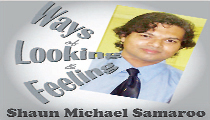Skills shortages show up everywhere across the country. The crisis is crippling.
Such a pervasive shortage of this crucial national resource base, our human capital, causes all manner of problems.
The alarming lack of educated imagination, to use a phrase coined by Canadian thinker Northrup Frye, causes this country to stumble about in a stupor. Development suffers. People face incredible odds in struggling to build a decent life.

The easiest way of building a quick skills pool would be to partner and network with the Diaspora, as is the case with India, China, Brazil and even Russia and other fast developing nations.
The Guyanese nation is not backward. We have world class skills accomplishing amazing feats all over the world, with folks rising to great positions of leadership.
Government needs to design a programme as a matter of urgency, to tap into the global pool of skilled Guyanese. Of course, being able to pay these skilled people might be a problem, but a compensation package comprising immediate and long term benefits and payments could be designed to make it attractive for skilled Guyanese to contribute back to their nation.
This week, New York based Guyanese actor-producer, Mahadeo Shivraj, leads a team across this country showcasing a Bollywood style Guyanese movie. This is the kind of difference overseas Guyanese make. The Ministry of Youth and Culture played a role in Shivraj’s resurgent role in local theatre.
Don Gomes re-migrated from Canada and plays a vital role in city affairs, taking it upon his shoulders to clean up clogged canals.
Gomes has agreed, as an optician, to join forces with another Canadian-Guyanese, Raj Tribhuwan, to make a defining difference for the community of visually impaired persons. The two toured organizations serving this community in the city, and they saw the crushing need these people face everyday.
Every day 12 severely visually impaired children show up for school at St Rose’s High School in the city. In Linden, another 24 visually impaired kids show up at the Wismar Primary School. These kids seek an education. Their parents want them to attend school and grow up educated and able to live as well as other Guyanese citizens.
A blind woman, 36-year old Karen Ifill, just became head of the Senate in Barbados. Persons with disabilities in developed societies worldwide are making incredible strides in being able to live and contribute as well as any other citizen. Not so in Guyana.
Raj Tribhuwan knows that. As a blind Guyanese, facing this debilitating visual disability since he was a toddler living at Enmore, East Coast Demerara, Tribhuwan had to battle huge odds growing up in this country.
He migrated 25 years ago, and today lives in Canada. As a Canadian, he grew in leaps and bounds, being able to become educated.
He now travels around Ontario teaching Access Technology to visually impaired Canadians, a lot of them migrants from all over the world.
Tribhuwan has become a leader in the community of visually impaired persons in Ontario.
And, this week, he is back home to impart his knowledge, skills and experience to make a difference for the community of visually impaired persons in his native land. With Gomes taking a keen interest in this non-profit work, the two met with relevant leaders in these communities and have started the process of transforming how visually impaired people experience life in this country.
The Guyana Society for the Blind says 120 legally blind persons are registered in the city.
St Rose’s High and Linden have inclusive education units for visually impaired kids. Elsewhere in the country – Berbice, Essequibo, Leguan and Wakenaam, the hinterland – kids go through life without such blessings. Visually impaired people end up living alone, isolated and starved of the hope of a good life.
Tribhuwan wants to see this situation transformed.
In Canada, he saw his life completely transformed. And he sees daily the miraculous transformation that takes place among the community of disabled persons there. The only tool they need is a computer and decent internet access, with relevant training.
In Georgetown, he found members of the Society for the Blind “in the same situation as I remember from being here 30 years ago”. Housed at a drab, dilapidated building in a depressed section of the city, off High Street, visually impaired folks navigate garbage littering the place into a nasty eyesore, to access the building.
Yet, these people got computers from the government laptop programme. And they sit around at the Institute with their mobile computers, equipped with the Jaws software that allows them to interact with the computer, slowly transforming their lives. With a computer and internet, they face a bright future.
But, the school units at Linden and St Rose’s High lack any type of internet access. Tribhuwan and Gomes traversed Georgetown this week trying to get a simple wireless internet access for the rooms housing the classes for the visually impaired kids, and encountered enormous bureaucracy and lack of care.
At GT&T, the wall of bureaucracy was thick with stony-faced guards and employees who refused to entertain the crushing need of these kids.
Gomes and others have promised to follow up to make sure the units get internet access.
This challenge, to simply equip the blind units at Linden and St Rose’s High with internet access, exposed the frustrating abyss into which institutions in this country have fallen. We lack the key skills that allow us to even care for the visually impaired children among us.
Tribhuwan experienced walking the streets of Georgetown, and seeing the complete lack of care from drivers, despite his white cane being prominently displayed.
Our lack of skills causes us to be a people who cannot even care for those less fortunate than us, and it’s a terrible place for any nation to be.
We lack the skills to care for even our blind children, to offer them hope of a good future.





